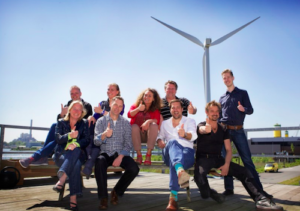
Amsterdam, The Netherlands—For the past nine years, a Dutch cooperative wind power project in Amsterdam has been stalled by regulations imposed by political opponents.
The project was initiated in 2007 by local co-op Onze Energie along with venture partner NDSM Energy and other wind co-ops. It would be the largest project involving Windvogel, a democratically run citizens’ wind energy co-op of 3,300 members. If successful, the project could supply enough power for thousands of Amsterdam households and all 400 companies on its proposed location, Amsterdam’s NDSM Wharf.
After nine years of collaborative effort, the coalition has learned how time-consuming the planning and political process for wind energy development in the Netherlands can be.
In addition to meeting national environmental regulations, the project, like other wind farms in North Holland, has to meet stringent and, some would say unnecessary, additional provincial statutory requirements. The province requires that wind farms must consist of at least six turbines, each sited at least twice as far from residential areas as national laws require. For each new wind turbine, developers must also buy and retire two old turbines.
Although NDSM Energy and its partners cannot meet all the provincial statutory requirements, the co-ops have decided to seek an exemption from these regulations and apply for a license anyway, with the support of the Amsterdam city council, which owns the proposed project site.
In May 2016, NDSM representing itself and its citizen co-op alliance, submitted a license application for its 15 MW wind project near the NDSM Wharf. Provincial authorities later reversed the permit, claiming jurisdiction over wind projects on their territory.
“The province actually limits the number of wind turbines that Dutch people can put in North Holland,” NDSM Director Martijn Pater said. When the conservative-liberal political party VVD won control of the provincial government in 2011, “they actually promised the voters that they will put up as few wind turbines as possible…. They don’t believe in sustainable energy because it is heavily subsidized.”
According to Pater, the province has blocked NDSM from building a turbine for which it had strong local support, a city permit, and federal subsidies. The turbine would have been the first of the six-turbine NDSM-Windvogel project. Four of the project’s turbines would be sited along a highway near NDSM, and two would be along the waterfront.
This experience exemplifies the difficulties that citizens of the Netherlands have encountered in trying to help the nation meet its clean energy goals.
NDSM, joined by the City of Amsterdam, took the provincial government to court last November. The Environment Department for the North Sea Canal Area is currently reviewing the Amsterdam Wind and NDSM application along with others, and the province expects to issue its first licenses in 2017.
“Although politics and restrictive government policies can be a frustrating phenomenon,” NDSM Projects Manager Keijen van Eijk observed, “I think the bottom-up movement of citizens and businesses is here to stay and plays a crucial role in the energy transition.”
*This article was published at Renewable Energy World on Aug. 31, 2016